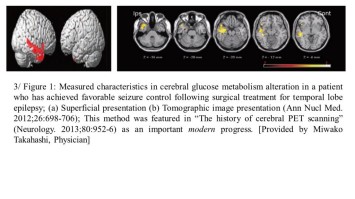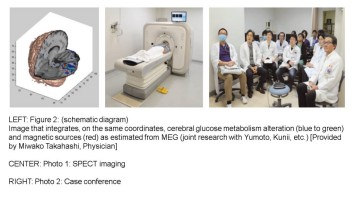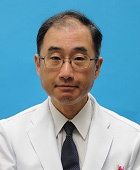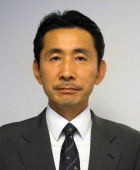Top > About Us > News Letter > てんかんセンター
New Epilepsy Center Established
Feature article
To provide more accurate diagnosis and appropriate treatment for epilepsy
New Epilepsy Center Established
—Aiming at improved diagnostic accuracy through broad collaboration among clinical departments and units
Background to establishment
In recent years, the environment surrounding epilepsy has been changing substantially. As needs for more appropriate epilepsy treatment grow, new therapeutic drugs have emerged, the accuracy of diagnostic methods has improved, and surgical therapies have progressed, ushering in a new era in treating the disorder. In 2015, WHO suggested the enhancement of comprehensive epilepsy treatment. To provide epilepsy diagnosis and treatment at a more appropriate and higher level in response to these substantial changes, the University of Tokyo Hospital established an Epilepsy Center in October 2016, and opened an outpatient unit for first-time patients in January 2017.
Progress in therapeutic technology has enabled many patients with epilepsy to lead a life free of seizures. However, they are still faced with direct and indirect inconveniences, including anxiety about the possibility of relapse, psychological and financial burdens of drug administration, concerns about adverse side effects of drugs and potential impacts on pregnancy, restrictions in employment, social prejudice, and lack of understanding. To provide care to epilepsy patients who are facing such difficulties, it is desirable that treatment, rehabilitation, and patient education based on appropriate information provision by various departments be included, as opposed to conventional diagnosis and treatment by a single clinical department. To this end, it is important to establish a comprehensive care system that engages an inter-disciplinary team made up of diverse specialists from throughout the hospital. The term “Epilepsy Center” refers to an epilepsy care system that can be organized by networking functional entities that provide the respective expertise and skills from multiple related departments. To date, 35 facilities have been registered as Epilepsy Centers across Japan (Japan Epilepsy Center Association;). Epilepsy Centers particularly focus on comprehensive diagnosis and treatment for refractory epilepsy, while collaborating with local medical facilities for the purpose of improving epilepsy care throughout the entire healthcare system.
Features of our Epilepsy Center
1) Diagnosis of epilepsy
The first feature of our Epilepsy Center is the broad range of related clinical departments and units. As clinical departments that treat patients with epilepsy, it has been common to refer to Pediatrics for onset during infancy, to Neurology for onset in adulthood, and to Neurosurgery if surgical operation becomes necessary for treatment. At our Center, specialists in epilepsy from Neuropsychiatry and specialists in dementia from Geriatrics also join the team.
Over the course of its progression, epilepsy involves various mental symptoms including anxiety and depression. Meanwhile, conditions that are often mistaken for epilepsy include psychogenic non-epileptic seizures, which are considered to be caused by mental problems. It is recognized as extremely important for epilepsy treatment to provide appropriate care for mental symptoms of patients with epilepsy, and to correctly diagnose psychogenic non-epileptic seizures.
Japan is advancing toward an unprecedented super-aging society. The onset of epilepsy has two peaks, during infancy and old age. The number of patients developing epilepsy during old age is increasing. In such patients, differentiation between dementia and epilepsy symptoms becomes difficult, with some epilepsy seizure symptoms are at risk of being mistaken for a decline in cognitive functions caused by dementia. In elderly patients with epilepsy, abnormal findings are sometimes difficult to identify even through EEG. Deployment of a team that consists not only of specialists in epilepsy but also specialists in diseases that manifest similar symptoms enhances the accuracy of epilepsy diagnosis.
A broad range of specialists are engaged in the diagnosis of epilepsy, including diagnosis through EEG, diagnostic imaging, and psychological testing. Our Epilepsy Center is one of only a handful in Japan that engages a number of clinical departments and units, with care provided by inter-disciplinary teams made up of specialists from throughout the hospital. Such teams include not only physicians specializing in EEG, MEG, and other neurophysiological testing but also specialists in nuclear medicine diagnostic imaging. Nurses, clinical technologists, and other healthcare professionals engaged in long-time video-EEG monitoring, which is extremely important for the diagnosis of epilepsy, are also on the teams, along with clinical psychologists, occupational therapists, social workers, and pharmacists.
Another of our strengths is that all key tests required for the diagnosis of epilepsy can be conducted at our Center. Following a process of academic presentation and patent application, we have developed a new automatic analysis method to estimate the focus of epilepsy (Figure 1), which has been leveraged in the diagnosis of respective focus in individual patients (Figure 2 and Photo 1).
2) Treatment of epilepsy
Regarding treatment, new antiepileptic drugs have been developed in quick succession recently, providing a broader selection of internal medicines for patients who have difficulties in adequately controlling seizures. While many patients are able to control seizures by taking appropriate antiepileptic drugs, seizure control is difficult for some patients without surgery. Regarding treatment in cases where surgery is an option, the treatment policy for each patient is examined in detail in online case conferences that connect staff from related clinical departments and units in our hospital with specialists at other facilities (Photo 2).
A unique feature of surgical epilepsy treatment at our hospital is that we offer all procedures for all age groups. In recent years, vagus nerve stimulation therapy has drawn attention as a new surgical therapy in addition to surgical resection of parts of the brain that cause epileptic seizures. Our hospital has introduced vagus nerve stimulation therapy earlier than any other facilities in Japan, and is a leader in terms of the number of operations performed using this method.
Departments/Divisions
Pediatrics, Children's Medical Center
Titles
M.D. , Ph.D.
Expertise/Specialties
Pediatrics, Child Neurology, Perinatal and Neonatal Medicine
Research Interests
1) Perinatal brain injury 2) Environmental effects of development
3) Congenital cytomegalovirus infection 4) Developmental disorders
5) Subacute Sclerosing Panencephalitis 6) Public health screening system
Languages
Japanese/ English
See More
Departments/Divisions
Urology and Andrology
Titles
M.D. , Ph.D.
Expertise/Specialties
Robotic Surgery, Laparoscopic Surgery, Endoscopic Surgery, Kidney Cancer, Urinary Tract Cancer, Bladder Cancer, Prostate Cancer, Testicular Cancer, Adrenal Tumor, Renal failure, Peritoneal Dialysis
Research Interests
Molecular Biology, Genome Research
Languages
See More
Departments/Divisions
Clinical Research Governance
Titles
Ph.D.
Expertise/Specialties
Clinical Reseach, GCP, regulation
Research Interests
Quality Management
Languages
Japanese / English
See More
Departments/Divisions
Department of Neurosurgery
Titles
M.D. , Ph.D.
Expertise/Specialties
Acoustic neuroma surgery, Arteriovenous malformation surgery, Skull base meningioma surgery, vertebrobasilar aneurysm surgery
Research Interests
Functional preservation of brain, brainstem and cranial nerves, surgical simulation with 3DCG, functional restoration by brain-machine interface (BMI), neural regeneration by recruitment of endogenous progenitors
Languages
Japanese/ English
See More
Departments/Divisions
Pharmaceutical Department
Titles
Ph.D.
Expertise/Specialties
pharmacy
Research Interests
clinical and molecular pharmacology / toxicology, and systems-biology / pharmacology / toxicology
Languages
Japanese / English
See More
Departments/Divisions
Department of Blood Transfusion
Titles
M.D., Ph.D.
Expertise/Specialties
Transfusion Medicine, Respiratory Medicine, Allergy and Clinical Immunology
Research Interests
Mechanism of transfusion complications, Haemovigilance
Languages
Japanese / English
See More
Departments/Divisions
Department of Pediatric Surgery
Titles
M.D. , Ph.D.
Expertise/Specialties
Pediatric Surgery, Pediatric Minimally Invasive Surgery, Pediatric Oncology, Pediatric Urology, Pediatric HBP Surgery
Research Interests
Pediatric Hepatobiliary disease, Pediatric MIS, Transplantation Immunology
Languages
Japanese/English
See More
Departments/Divisions
Central Supply Service
Titles
M.D. , Ph.D.
Expertise/Specialties
General Surgery, Operative Medicine, Nutrition Support
Research Interests
Surgical Nutrition and Metabolism, Gut Immunity
Languages
Japanese, English
See More
Departments/Divisions
Department of Gastroenterology; Department of Endoscopy and Endoscopic Surgery
Titles
M.D. , Ph.D.
Expertise/Specialties
Gastroenterology, Hepatology (Hepatitis, Hepatocellular Carcinoma), Pancreatology
Research Interests
Viral hepatitis, Hepatocarcinogenesis, NASH, Oxidative stress
Languages
Japanese / English
See More
Departments/Divisions
Allergy and Rheumatology
Titles
M.D. , Ph.D.
Expertise/Specialties
Rheumatology, Internal Medicine
Research Interests
Clinical Immunology, Basic Immunology
Languages
Japanese, English
See More
Departments/Divisions
Department of Psychosomatic Medicine
Titles
M.D. , Ph.D.
Expertise/Specialties
Psychosomatic Medicine
Research Interests
Research on development of treatment for eating disorders and on development of mobile tools for assessment and treatment for life-style related disorders and mood disorders using EMA and EMI methods.
Languages
Japanese / English
See More
Departments/Divisions
Neuropsychiatry, Medical Community Network and Discharge Planning
Titles
M.D. , Ph.D.
Expertise/Specialties
Clinical Psychiatry, Early intervention and rehabilitation for schizophrenia, Community mental health
Research Interests
Neuroimaging in psychiatric disorders, Mental health and neuroscience in adolescence
Languages
Japanese / English
See More
Departments/Divisions
Infection Control and Prevention Service/Department of Infection Control and Prevention Graduate School of Medicine
Titles
M.D. , Ph.D.
Expertise/Specialties
Infection Control and Prevention Service/ Hepatocellular carcinoma, Liver diseases, Viral hepatitis, Liver diseases
Research Interests
Mechanism of hepatocarcinogenesis and relarion between carcinogenesis and mitochondria damage
Languages
Japanese/English
See More
Departments/Divisions
Ophthalmology
Titles
M.D., Ph.D
Expertise/Specialties
Glaucoma, Neurobiochemistry, Ocular Pharmacology
Research Interests
・the analysis of the risk factor activating glaucoma
・the study of the surgical outcomes of glaucoma
・the elucidation to the pathology of increasing intraocular pressure through bioactive lipids
・the development of new drops for glaucoma
Languages
Japanese, English
See More
Departments/Divisions
Breast and Endocrine Surgery
Titles
M.D. , Ph.D.
Expertise/Specialties
surgery on primary breast cancer, systemic treatment on metastatic breast cancer
Research Interests
epigenetic change which is critical for breast cancer development, transcriptional regulation of estrogen receptor alpha (ERα)in breast cancer
Languages
Japanese/English
See More
Departments/Divisions
Division of Nephrology and Endocrinology, Department of Hemodialysis and Apheresis
Titles
M.D. , Ph.D.
Expertise/Specialties
Chronic kidney disease, Acute kidney injury, End stage kidney disesae, Hemodialysis, Nephrotic syndrome, Renal anemia, Atypical hemolytic uremic syndrome
Research Interests
Oxygen metabolism of the kidney, immunological kidney injury, epigenetics, renal anemia
Languages
Japanese/English
See More
Departments/Divisions
Department of Pain and Palliative Medicine
Titles
M.D. , Ph.D.
Expertise/Specialties
Pain Medicine, Palliative Medicine, Anesthesiology, Critical Care Medicine, Medical Engineering
Research Interests
Pain Medicine, Palliative Medicine, Cognitive Neuroscience, Health Literacy
Languages
Japanese
See More
Departments/Divisions
Geriatric Medicine
Titles
M.D. , Ph.D.
Expertise/Specialties
geriatric medicine, gerontology
Research Interests
Pharmacotherapy and its safety in the elderly. Gender difference in geriatric medicine.
Languages
Japanese, English
See More
Departments/Divisions
Department of Hematology and Oncology
Titles
M.D. , Ph.D.
Expertise/Specialties
Hematological malignancies
Research Interests
Leukemia
Languages
Japanese, English
See More
Departments/Divisions
Department of Cardiovascular Surgery & Department of Cooperative Unit of Medicine and Engineering Research
Titles
M.D. , Ph.D.
Expertise/Specialties
Adult Cardiac Surgery, Minimally Invasive Cardiac Surgery, Robotic Cardiac Surgery, Mitral Valve Plasty, Off-pump Coronary Artgery Bypass Surgery, Ventricular Assist Device, Heart Transplantation
Research Interests
Surgical Treatment of End-stage Heart Failure (Ventricular assist device, Heart transplantation, Mitral complex plasty), Device Development for Minimally Invasive Surgery, Regenerative Medicine
Languages
Japanese/English
See More
Departments/Divisions
Plastic Reconstructive and Aesthetic Surgery
Titles
M.D., Ph.D.
Expertise/Specialties
Reanimation of Established Facial paralysis, Reconstruction of Facial Deforimites, Wound Healing
Research Interests
Microsurgery, Facial Paralysis, Ageing
Languages
Japanese/English
See More
Departments/Divisions
Department of Acute Medicine
Critical Care and Emergency Medical Center/Emergency Room, Intensive Care Unit
Titles
M.D., Ph.D
Expertise/Specialties
emergency medicine, critical care medicine, intensive care medicine, disaster medicine, mass gathering medicine
Research Interests
acuity, triage, monitoring, emergency medical service system, disaster medical response system
Languages
English /Japanese
See More
Departments/Divisions
Department of Rehabilitation Medicine, Rehabilitation Center
Titles
M.D. , Ph.D.
Expertise/Specialties
Pediatric Rehabilitation, Rehabilitation and Prosthetics/Orthotics for Congenital Limb Malformation, Rehabilitation for Bone Dysplasias
Research Interests
Pediatric Rehabilitation, Rehabilitation for Disabled Children, Motion Analysis
Languages
Japanese / English
See More
Departments/Divisions
Center for Epidemiology and Preventive Medicine
Titles
M.D. , Ph.D.
Expertise/Specialties
Gastroenterology, Preventive Medicine
Research Interests
Oncology, Epigenetics, Molecular biology, Differentiation and Cancer
Languages
Japanese, English
See More
Departments/Divisions
Neurosurgery
Titles
M.D. , Ph.D.
Expertise/Specialties
Neurosurgery
Research Interests
Surgery of cerebrovascular diseases, Surgery of benign brain tumors, Experimental cerebral ischemia
Languages
Japanese/English
See More
Departments/Divisions
Department of Radiology
Division of Diagnostic Radiology
Titles
M.D., Ph.D
Expertise/Specialties
General diagnostic radiology, neuroradiology, interventional radiology
Research Interests
Voxel-based analysis, voxel-based morphometry, diffusion magnetic resonance imaging,
functional magnetic resonance imaging
Languages
Japanese/English
See More
Departments/Divisions
Stomach and Esophageal Surgery, Cancer Resource Center
Titles
M.D. , Ph.D.
Expertise/Specialties
Abdominal Surgery, General Surgery, Cancer Patients' Care
Research Interests
Gastric Carcinogenesis, Stem Cell and Carcinogenesis, Cancer Biomarker, Cancer Immunology, Growth Factor, Development
Languages
English, Japanese
See More
Departments/Divisions
Orthopaedic Surgery and Spinal Surgery
Titles
M.D. , Ph.D.
Expertise/Specialties
Joint surgery, rheumatoid arthritis, osteoporosis
Research Interests
Bone and cartilage biology, arthritis
Languages
Japanese, English
See More
Departments/Divisions
Dermatology
Titles
M.D. , Ph.D.
Expertise/Specialties
Scleroderma
Research Interests
Scleroderma, B lymphocytes, Autoimmunity
Languages
Japanese/English
See More
Departments/Divisions
Colorectal Surgery; Vascular Surgery
Titles
M.D., Ph.D
Expertise/Specialties
General Surgery, Gastrointestinal Surgery, Colorectal Surgery, Laparoscopic Surgery, Robotic Surgery, Minimally Invasive Surgery, Chemotherapy, Gastrointestinal Endoscopy, Colorectal Disease, Anorectal Disease, Colorectal Cancer, Inflammatory Bowel Disease, Diverticular Disease, Colorectal Polyp, Vascular Surgery, Abdominal Aortic Aneurysm, Thoracic Aortic Aneurysm, Endovascular Aneurysm Repair, Thoracic Endovascular Aortic Repair, Distal Bypass, Critical Limb Ischemia, Takayasu's Disease, Buerger Disease, Pancreatoduodeal Artery Aneurysm, Popliteal Entrapment Syndrome, Behçet's Disease, Carotid Endarterectomy, Hemodialysis, Peripheral Artery Aneurysm, Segmental Arterial Mediolysis, Deep Vein Thrombosis
Research Interests
Surgical Oncology, Vascular Surgery
Languages
Japanese/English
See More
Departments/Divisions
International Medical Center
University of Tokyo Tissue Bank
Artificial Organ and Transplantation Division, Department of Surgery
Titles
M.D., Ph.D., F.A.C.S.
Expertise/Specialties
Surgery, Heaptology, Liver Transplantation, Tissue Transplantation, Medical Education
Research Interests
Liver Disease, Liver Trasnplantation, Organ Transplantation, Donor Safety in Living Liver Donor, Tissue Transplantation, Tissue Banking, Cyropreservation of homograft, Medical Education, Surgical Training, Medical Care for Foreign Patients in Japan, Multicultural Resource for Health Care, Cross border clinical medicine
Languages
Japanese / English
See More
Departments/Divisions
Respiratory Medicine
Titles
M.D. , Ph.D.
Expertise/Specialties
Respiratory Medicine
Research Interests
The mechanism of respiratory diseases including COPD, asthma and pulmonary fibrosis
Languages
Japanese/English
See More
Departments/Divisions
University Hospital Medical Information Network Center Department of Heath Communication, School of Public Health, Faculty of Medicine, the University of Tokyo
Titles
M.D., Ph.D.
Expertise/Specialties
health communication, health informatics
Research Interests
Interpersonal and media-based health communication
Languages
Japanese/English
See More
Departments/Divisions
Department of Diabetes and Metabolic Diseases
Titles
M.D., Ph.D.
Expertise/Specialties
Diabetes, Metabolism, Obesity, Nutrition,
Research Interests
Pathogenesis of type2 diabetes, insulin resistance, adiponectin
Languages
Japanese / English
See More
Departments/Divisions
Clinical Research Support Center
Titles
M.D. , Ph.D.
Expertise/Specialties
Clinical Pharmacology, Neurology
Research Interests
Clinical Pharmacology, Neurology
Languages
Japanese, English
See More
Departments/Divisions
Otorhinolaryngology and Auditory and Voice Surgery
Titles
M.D. , Ph.D.
Expertise/Specialties
Otology, Audiology, Neurotology
Research Interests
Cochlear implant, hearing loss, regeneration, anti-aging
Languages
Japanese, English
See More
Departments/Divisions
Pathology
Titles
M.D. , Ph.D.
Expertise/Specialties
Gastrointestinal pathology
Research Interests
The pathology and molecular biology of gastrointestinal tumor
Languages
Japanese, English
See More
Departments/Divisions
Environment, Health and Safety Office
Titles
M.D., Ph.D.
Expertise/Specialties
Neurology
Research Interests
Clinical Neurology, Quality and Safety in Hospital Practice
Languages
Japanese, English
See More
Departments/Divisions
Obstetrics and Gynecology, Perinatal Center
Titles
M.D. , Ph.D.
Expertise/Specialties
Perinatal care for both normal and abnormal antepartum, labor, delivery, fetus and newborn, puerperium
Research Interests
Reproductive immunology / Perinatology / Reproductive Endocrinology
Languages
Japanese / English
See More
Departments/Divisions
Department of Diabetes and Metabolic Diseases
Titles
M.D. , Ph.D.
Expertise/Specialties
Internal Medicine, Diabetes, Metabolism, Nutrition, Obesity, Metabolic Syndrome, Diabetic Complications, Atherosclerosis, Insulin Resistance, Adipokines, Nuclear Receptors, Epigenetics, GWAS, Sportology, Anti-Aging Medicine
Research Interests
The mechanisms by which obesity results in insulin resistance, atherosclerosis and short life
Languages
Japanese / English
See More
Departments/Divisions
Stomach and Esophageal Surgery, Breast and Endocrine Surgery
Titles
M.D. , Ph.D.
Expertise/Specialties
Upper GI surgery, Esophageal Cancer, Gastric Cancer
Research Interests
surgical procedure and oncology of esophageal and gastric cancer
Languages
Japanese and English
See More
Departments/Divisions
Anesthesiology and Pain Relief Center
Titles
M.D. , Ph.D.
Expertise/Specialties
Anesthesiology, Critical care medicine, Respiratory care, Operative medicine, Pain medicine
Research Interests
Acute lung injury, Mechanical ventilation, acute inflammatory response, Mechanism of general anesthesia, Modulation of pain
Languages
Japanese/ English
See More
Departments/Divisions
Department of Child Psychiatry
Titles
M.D. , Ph.D.
Expertise/Specialties
Child and Adolescent Psychiatry, Tourette Syndrome and Other Tic Disorders, Obsessive-Compulsive Disorder (OCD), Attention-Deficit/Hyperactivity Disorder (ADHD), Autism Spectrum Disorder (ASD), School Mental Health
Research Interests
Phenomenology, Pathogenesis and Intervention of Tourette Syndrome and Comorbid Disorders Including OCD and ADHD
Languages
Japanese/English
See More
Departments/Divisions
Gynecologic Surgery
Titles
Professor
Expertise/Specialties
Reproductive medicine, laparoscopic surgery, assisted reproductive technology
Research Interests
Pathogenesis and management of endometriosis, Ovarian physiology/ pathology
Languages
Japanese / English
See More
Departments/Divisions
Department of Clinical Laboratory
Titles
M.D. , Ph.D.
Expertise/Specialties
Laboratory Medicine, Clinical Hematology, Thrombosis and Hemostasis
Research Interests
Platelet Biology, Vascular Biology, Bioactive Lipids
Languages
Japanese/ English
See More














































